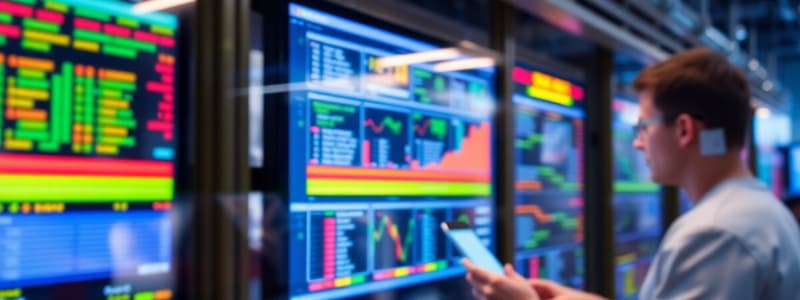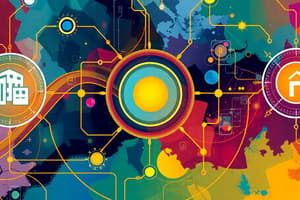Podcast
Questions and Answers
What is the ultimate goal of an ERP system?
What is the ultimate goal of an ERP system?
To satisfy customers (by improving service) and reduce costs.
Which of the following are primary components of an ERP system for a manufacturing organization? (Select all that apply)
Which of the following are primary components of an ERP system for a manufacturing organization? (Select all that apply)
- Product lifecycle management (correct)
- Human resource management (correct)
- Supply chain management (correct)
- Maintenance, repair, and operations (correct)
- Customer relationship management (correct)
- Accounting (correct)
What are the three main categories of software that may be included in PLM software?
What are the three main categories of software that may be included in PLM software?
- ERP, CRM, and PLM
- POS, accounting, and purchasing
- OLTP, TPS, and MIS/DSS
- CAD, CAE, and CAM (correct)
Cloud-based ERP solutions are becoming increasingly common.
Cloud-based ERP solutions are becoming increasingly common.
What is the purpose of a transaction processing system?
What is the purpose of a transaction processing system?
Which of these is NOT an example of a transaction processing system?
Which of these is NOT an example of a transaction processing system?
What does SCM stand for?
What does SCM stand for?
What is the function of CRM software?
What is the function of CRM software?
Which of the following is NOT a common challenge to successful enterprise system implementation?
Which of the following is NOT a common challenge to successful enterprise system implementation?
What are the main benefits of using a hosted software model for enterprise software?
What are the main benefits of using a hosted software model for enterprise software?
Which of the following are examples of the basic activities common to all transaction processing systems?
Which of the following are examples of the basic activities common to all transaction processing systems?
What is the main goal of an enterprise resource planning system?
What is the main goal of an enterprise resource planning system?
Identify the essential characteristic that differentiates batch processing systems from online transaction processing systems.
Identify the essential characteristic that differentiates batch processing systems from online transaction processing systems.
Which of the following is NOT a key feature of a CRM system?
Which of the following is NOT a key feature of a CRM system?
What is the primary goal of supply chain management (SCM)?
What is the primary goal of supply chain management (SCM)?
What are the three main types of software typically included within the scope of PLM software?
What are the three main types of software typically included within the scope of PLM software?
The hosted software model (i.e., SaaS) is typically associated with higher start-up costs compared to traditional on-premise software.
The hosted software model (i.e., SaaS) is typically associated with higher start-up costs compared to traditional on-premise software.
Which of these is a potential challenge in implementing enterprise systems?
Which of these is a potential challenge in implementing enterprise systems?
Identify three tips for avoiding a failed implementation of an enterprise system.
Identify three tips for avoiding a failed implementation of an enterprise system.
Flashcards
Transaction Processing Systems (TPS)
Transaction Processing Systems (TPS)
Systems that capture and process data about core business operations.
Batch Processing
Batch Processing
Processing multiple transactions at once, after they've occurred.
Online Transaction Processing (OLTP)
Online Transaction Processing (OLTP)
Real-time processing of individual transactions.
Order Processing Systems
Order Processing Systems
Signup and view all the flashcards
Point of Sale (POS) Systems
Point of Sale (POS) Systems
Signup and view all the flashcards
Accounting Systems
Accounting Systems
Signup and view all the flashcards
Purchasing Systems
Purchasing Systems
Signup and view all the flashcards
Reservation Systems
Reservation Systems
Signup and view all the flashcards
Source Data Automation
Source Data Automation
Signup and view all the flashcards
Enterprise Resource Planning (ERP) Systems
Enterprise Resource Planning (ERP) Systems
Signup and view all the flashcards
Business Process
Business Process
Signup and view all the flashcards
Improved Access to Data
Improved Access to Data
Signup and view all the flashcards
Streamlined Business Processes
Streamlined Business Processes
Signup and view all the flashcards
Improved Customer Service
Improved Customer Service
Signup and view all the flashcards
Cloud-based ERP
Cloud-based ERP
Signup and view all the flashcards
Supply Chain Management (SCM)
Supply Chain Management (SCM)
Signup and view all the flashcards
Customer Relationship Management (CRM)
Customer Relationship Management (CRM)
Signup and view all the flashcards
Product Lifecycle Management (PLM)
Product Lifecycle Management (PLM)
Signup and view all the flashcards
Computer-aided design (CAD)
Computer-aided design (CAD)
Signup and view all the flashcards
Computer-aided engineering (CAE)
Computer-aided engineering (CAE)
Signup and view all the flashcards
Computer-aided manufacturing (CAM)
Computer-aided manufacturing (CAM)
Signup and view all the flashcards
ERP Implementation Challenges
ERP Implementation Challenges
Signup and view all the flashcards
ERP Implementation Tips
ERP Implementation Tips
Signup and view all the flashcards
What are some benefits organizations expect from their TPS?
What are some benefits organizations expect from their TPS?
Signup and view all the flashcards
What are some examples of OLTP systems?
What are some examples of OLTP systems?
Signup and view all the flashcards
What is an ERP system?
What is an ERP system?
Signup and view all the flashcards
What are some advantages of ERP systems?
What are some advantages of ERP systems?
Signup and view all the flashcards
What are some leading ERP systems?
What are some leading ERP systems?
Signup and view all the flashcards
What are some challenges of implementing enterprise systems?
What are some challenges of implementing enterprise systems?
Signup and view all the flashcards
What are some tips for successful ERP implementation?
What are some tips for successful ERP implementation?
Signup and view all the flashcards
Hosted Software Model (SaaS)
Hosted Software Model (SaaS)
Signup and view all the flashcards
How does hosted software help businesses?
How does hosted software help businesses?
Signup and view all the flashcards
What are some key takeaways about enterprise systems?
What are some key takeaways about enterprise systems?
Signup and view all the flashcards
Study Notes
Enterprise Systems
- Transaction processing systems (TPSs) capture and process data about fundamental business operations.
- TPSs provide input to management information systems and decision support systems.
- Batch processing systems collect transactions over a period and process them in batches.
- Online transaction processing (OLTP) systems handle individual transactions in real-time.
- Traditional transaction processing methods often involve a mix of systems.
- Organizations expect their TPSs to accurately capture, process, and update databases, avoid fraudulent transactions, and produce timely reports.
- Order processing systems streamline the order lifecycle from placement to delivery.
- Point-of-sale (POS) systems are common in retail and restaurants for in-person transactions.
- Accounting systems track financial transactions.
- Purchasing systems support purchasing functions, including inventory control.
- Reservation systems manage bookings and reservations.
- Data collection can be manual or automated via special input devices.
- Source data automation captures data at its source and records it electronically.
Enterprise Resource Planning (ERP) Systems
- ERP systems integrate the functions of an organization.
- The goal of ERP systems is to improve customer satisfaction, reduce costs, and support daily business activities across various functions, such as supply chains, sales, marketing, human resources, and accounting.
- ERP systems use interrelated tasks and activities for their success.
- Companies implement ERP systems to create highly integrated sets of systems.
- Common challenges for ERP implementations include high costs, long implementation timelines, difficulty managing change, software customization challenges, and user frustration with new systems.
Tips for Avoiding Failed Implementations
- Allow sufficient time for the transition from old processes to new processes.
- Allocate sufficient time and resources for training.
- Keep the scope well defined and focus on essential business processes.
Hosted Software Model
- Hosted software models (SaaS) aim to reduce complexity and high start-up costs by hosting software off-site.
- Advantages include lower total cost of ownership, faster start-ups, and lower implementation risks.
- Disadvantages include potential security concerns and integrating hosted products from multiple vendors.
Supply Chain Management (SCM)
- SCM involves planning, executing, and controlling all activities in an organization.
- SCM includes sourcing raw materials, converting them into finished products, warehousing, and delivering them to customers.
- Integrated information systems are vital for efficient SCM.
Customer Relationship Management (CRM)
- CRM software captures customer data to improve communication and enhance relationships.
- CRM systems automate and integrate sales, marketing, and service functions.
- CRM software includes key features, such as contact management, sales management, customer support, and business analysis.
Product Lifecycle Management (PLM)
- PLM systems manage data and processes related to product lifecycles.
- PLM encompasses various phases of a product's lifecycle, including research and development, design, prototype, production, and service.
- PLM systems use computer-aided design (CAD), computer-aided engineering (CAE), and computer-aided manufacturing (CAM).
- Benefits of PLM include reduced time to market and reduced costs.
Studying That Suits You
Use AI to generate personalized quizzes and flashcards to suit your learning preferences.



